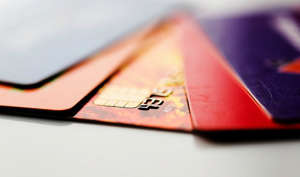Americans are suddenly defaulting on their credit cards
The American economy has looked pretty robust of late — unemployment just hit a 16-year low and stocks recently reached an all-time high.
This makes it all the more curious that Americans have suddenly stopped paying off their credit card bills at a rapid rate.
In the last two fiscal quarters, banks reported a steep rise in credit card charge-offs — debt that companies can’t collect from their customers — according to a report from Moody’s.
This chart from the report shows how each bank has fared on charge-offs, with Capital One, First National of Nebraska, and Synchrony showing the worst performance over the period:

The sharp increase, the largest since 2009, is especially unusual given how strong the US employment market has been, Moody’s noted. It suggests that American consumers haven’t fallen onto hard times so much as banks have started to loosen their standards and issue credit more aggressively.
Card issuers have been much stricter since the financial crisis and the passage of the CARD Act in 2009, which added an array of protections for consumers. Getting a credit card got a lot tougher, especially if you had sub-prime credit.
Charge-offs and unemployment tend to be related: When people lose their jobs, credit cards tend to be one of the first bills people stop paying, as compared to a home or auto loan where people risk losing those crucial assets.
So, charge-offs spiking when unemployment claims are low indicates that banks have lowered their standards and are approving people for cards who aren’t as credit worthy.
The ratio of charge-offs to unemployment claims had been hovering near all-time lows, but this chart shows that it’s shot back up to the historical average in the last two quarters — meaning standards might have deteriorated “rapidly,” according to Moody’s.











